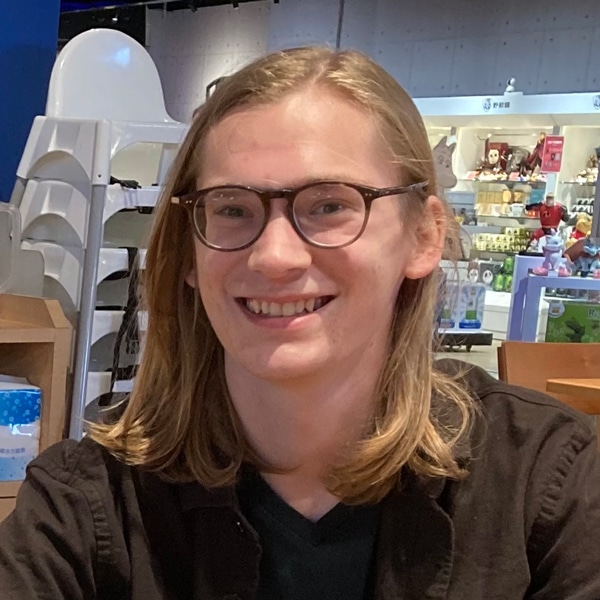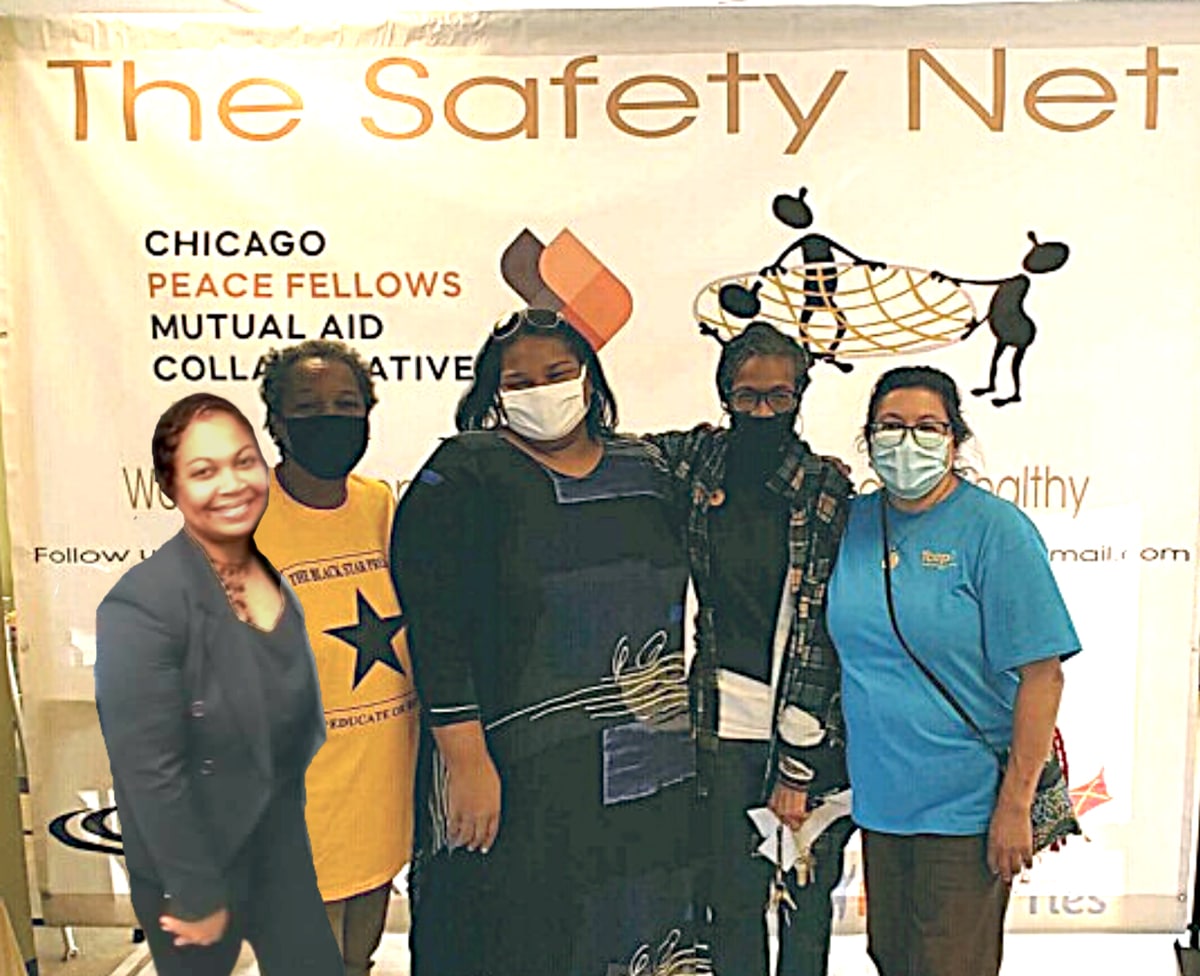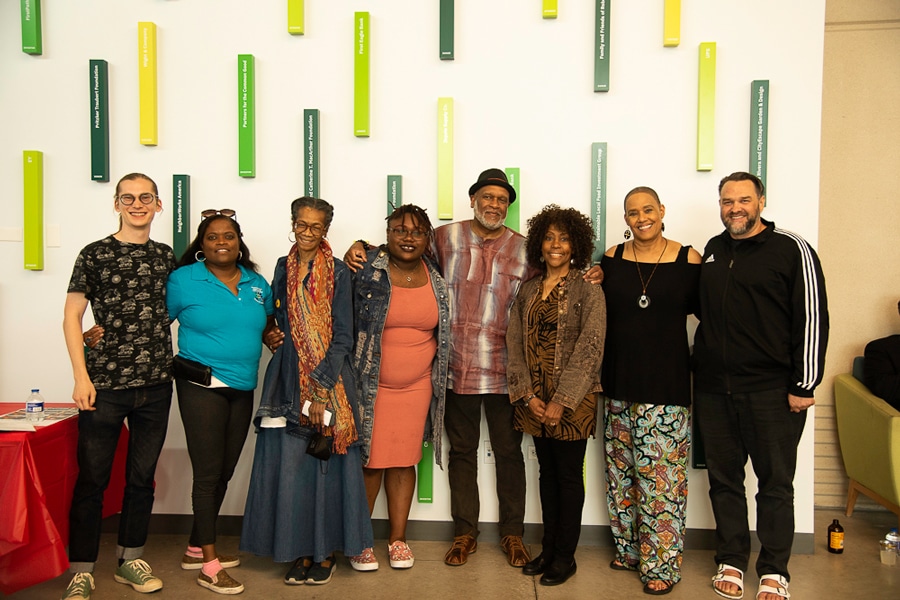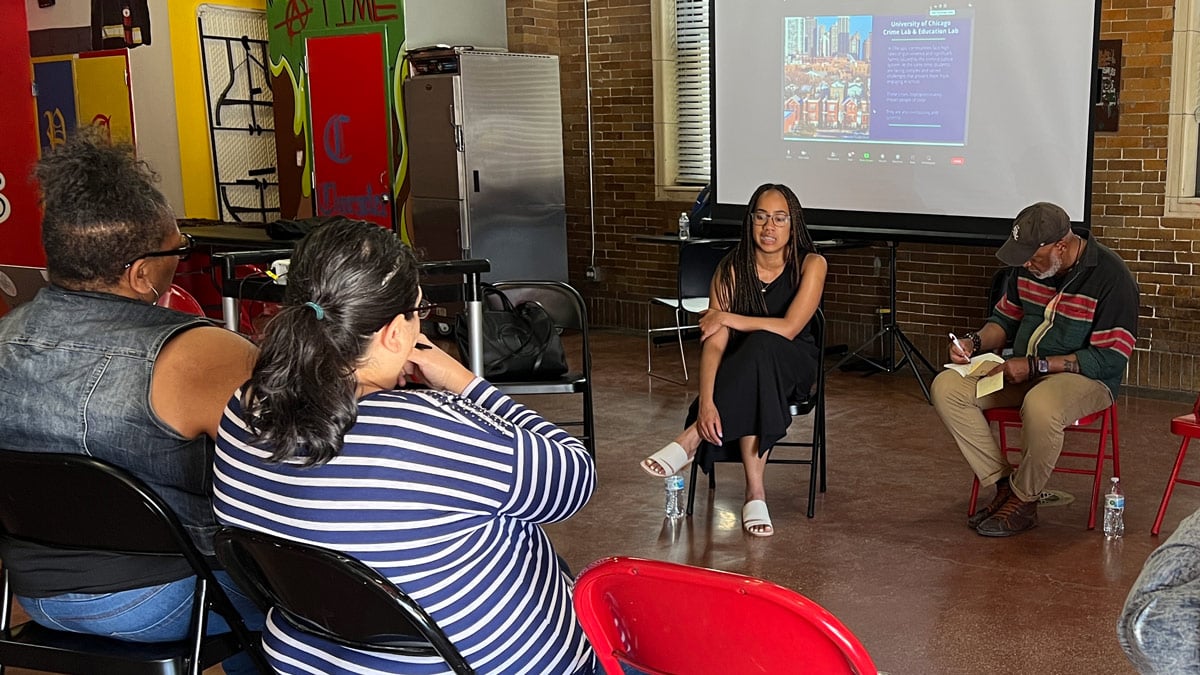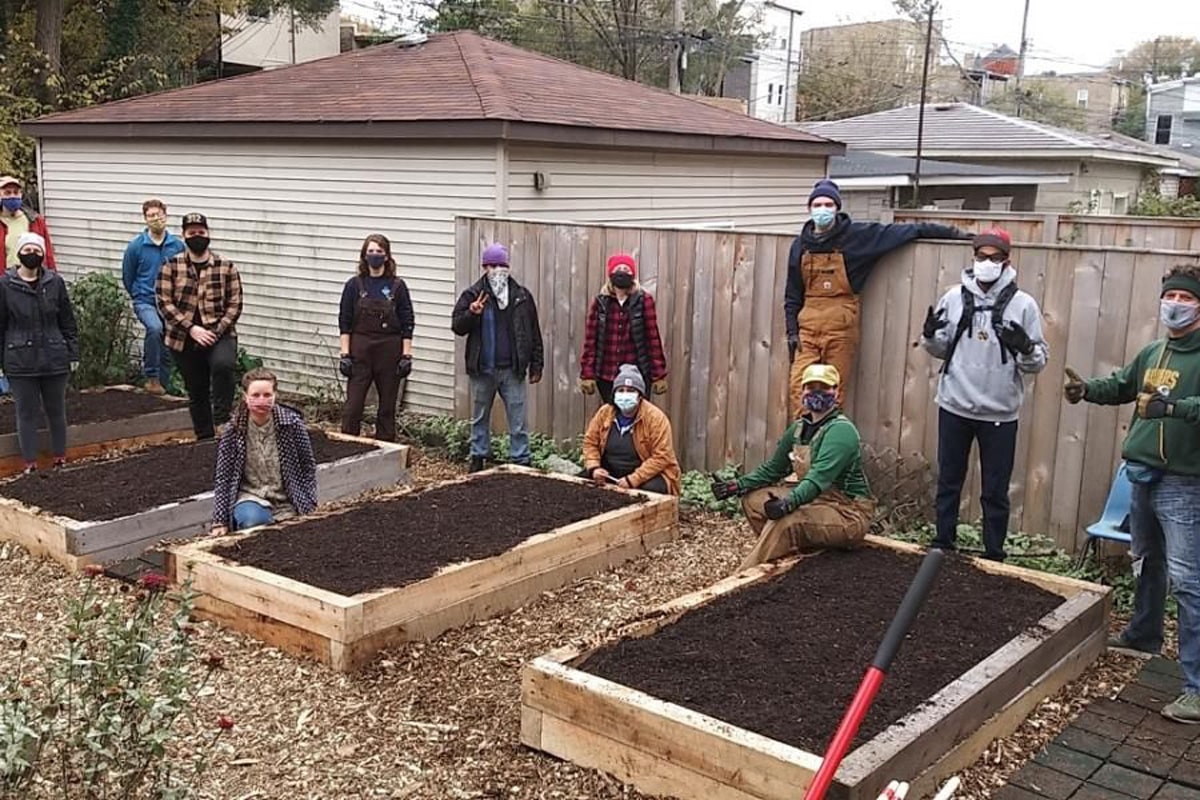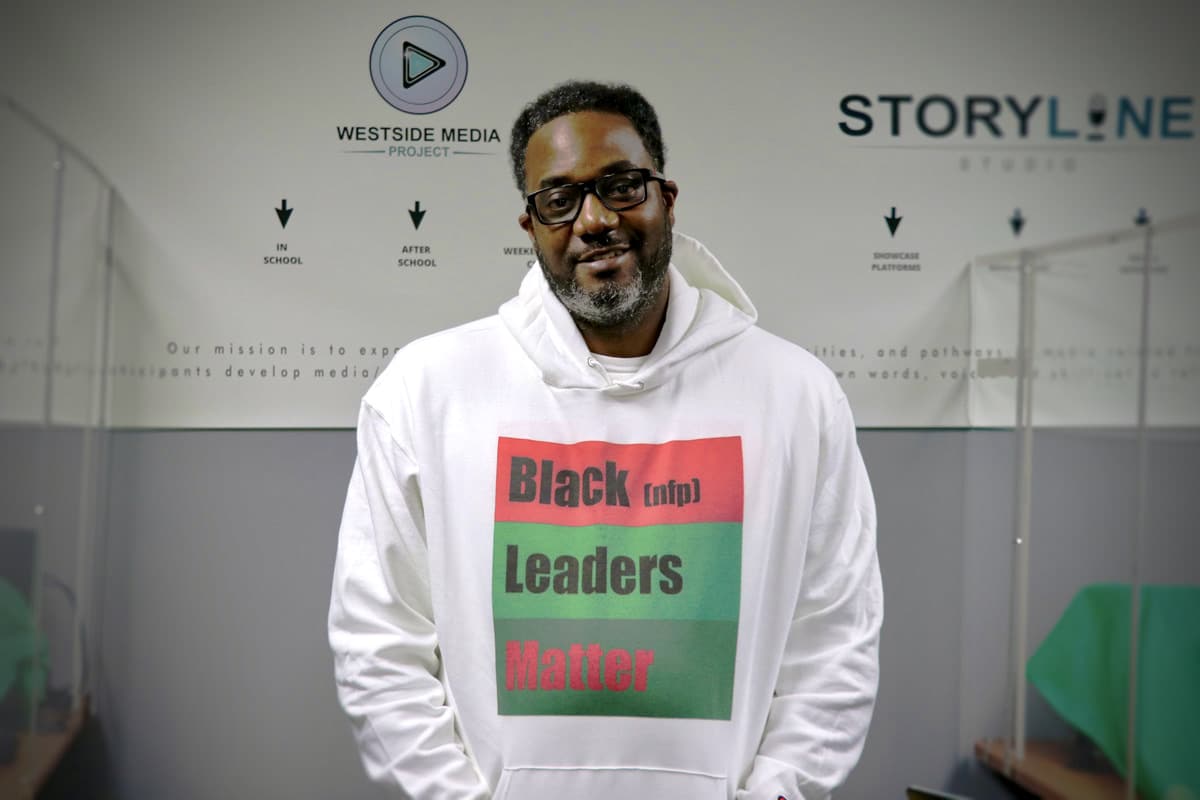Mutual Aid Collaborative Discusses How Violence Spreads with Dr. Andrew Papachristos
By Zeki Salah, Facilitator, Mutual Aid Collaborative
On Tuesday, August 23rd, the Chicago Peace Fellows Mutual Aid Collaborative met with Dr. Andrew Papachristos, Director of the Northwestern Neighborhood & Network Initiative. The meeting was part of the Mutual Aid Collaborative Civic Partners Series, which aims to create connections between individuals and organizations that work to build peace and prevent violence.
Dr. Papachristos studies social networks and how they can help activists understand and predict who is at the highest risk of becoming a victim of gun violence. He met with members of the Chicago Peace Fellows Mutual Aid Collaborative, a network of 60 Black and Brown leaders and activists who live and work in the communities they serve on the South and West sides. Fellows came in person and online to strategize with Dr. Papachristos about how they could act to prevent the spread of violence.
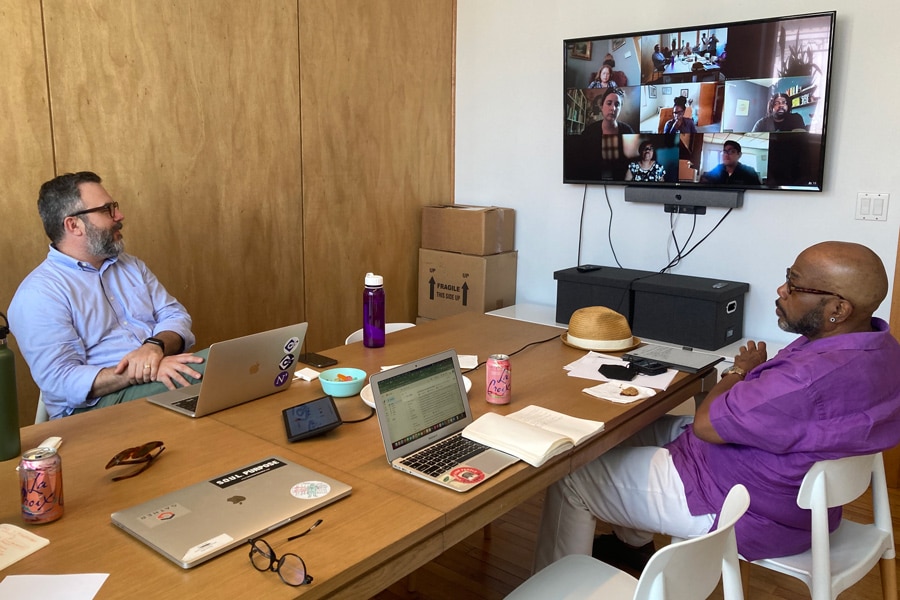
Dr. Papachristos’s research around gun violence gave Fellows insight into how the spread of gun violence can be predicted and preemptively addressed. As he presented his research, he made it clear that gun violence primarily spreads through a concentrated segment of the population. This finding suggests that most victims of gun violence either know each other or are linked together by only a few degrees of separation.
To illustrate how gun violence concentrates within particular communities, one section of Dr. Papachristos's presentation focused on how most gun violence injuries within cities affect a small proportion of the overall population. Data collected in Chicago between 2012-2016 showed that more than 70% of all subjects of gun violence are within social networks containing less than 5% of the city population, with 89% of those shootings occurring within a singular network. This insight is particularly pertinent to community activists and local organizations because it allows them to concentrate their efforts in violence prevention on the most vulnerable community members.
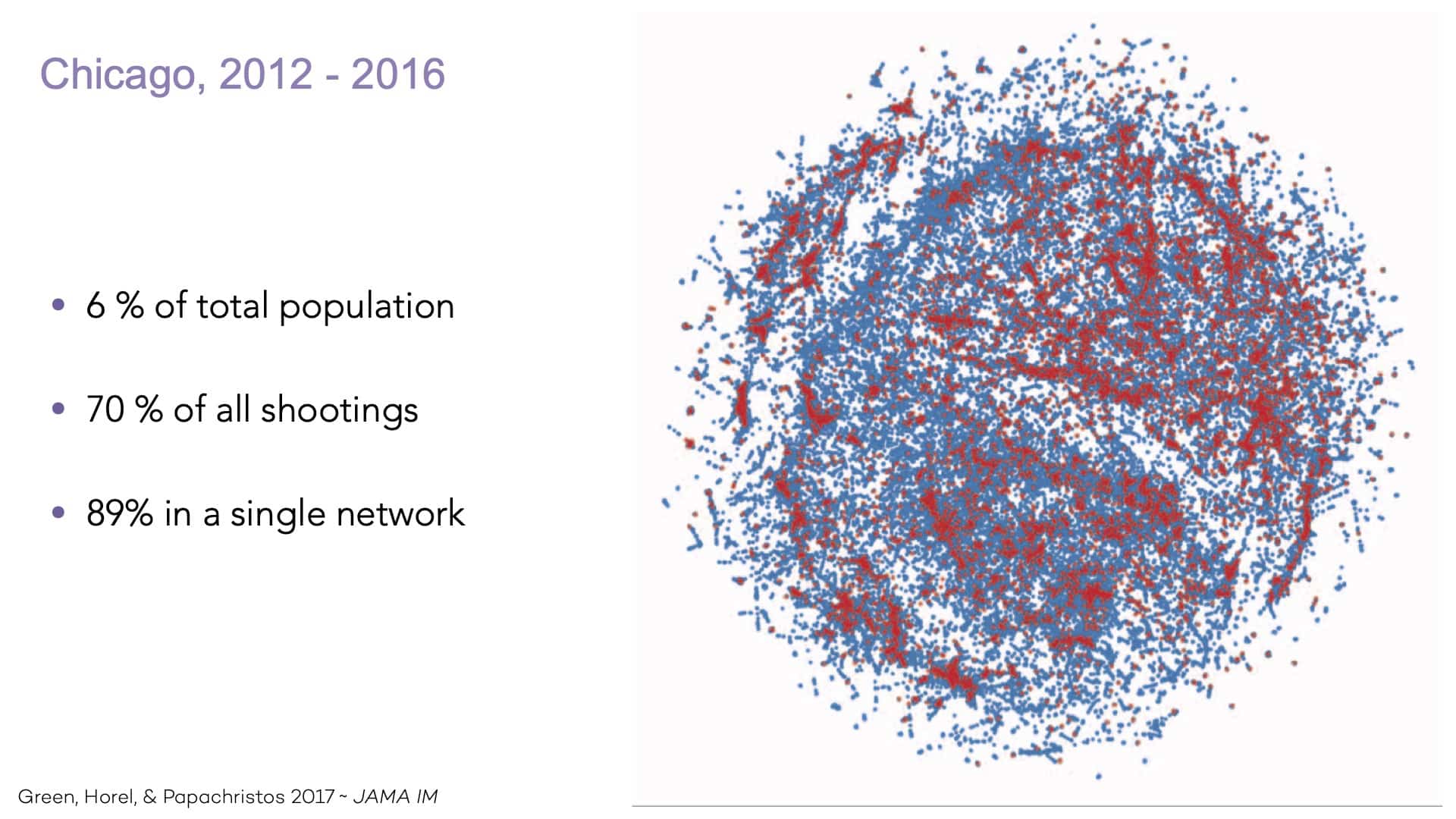
The social networks that Dr. Papachristos studies show that people affected by gun violence often share close social ties that have lasting consequences. When members of these networks face exposure to gun violence, it affects measurable aspects of their health, such as stress, sleep, and heart health. Additionally, people within these networks have a higher chance of becoming shot. While the probability of sustaining a gun injury is considerably higher for Black and Hispanic men in Chicago, the likelihood of becoming a victim rises exponentially when those men are in a social network where violence has previously occurred. Dr. Papachristos noted that a Black or Hispanic man between the ages of 14-24 within one of these networks has a higher chance of being shot than someone playing a game of Russian Roulette, in which the odds would be one in six. These figures helped frame the importance of understanding how social networks operate to the Fellows and how Fellows could utilize this information to reach members of the population facing the highest risk of becoming victims of violence.
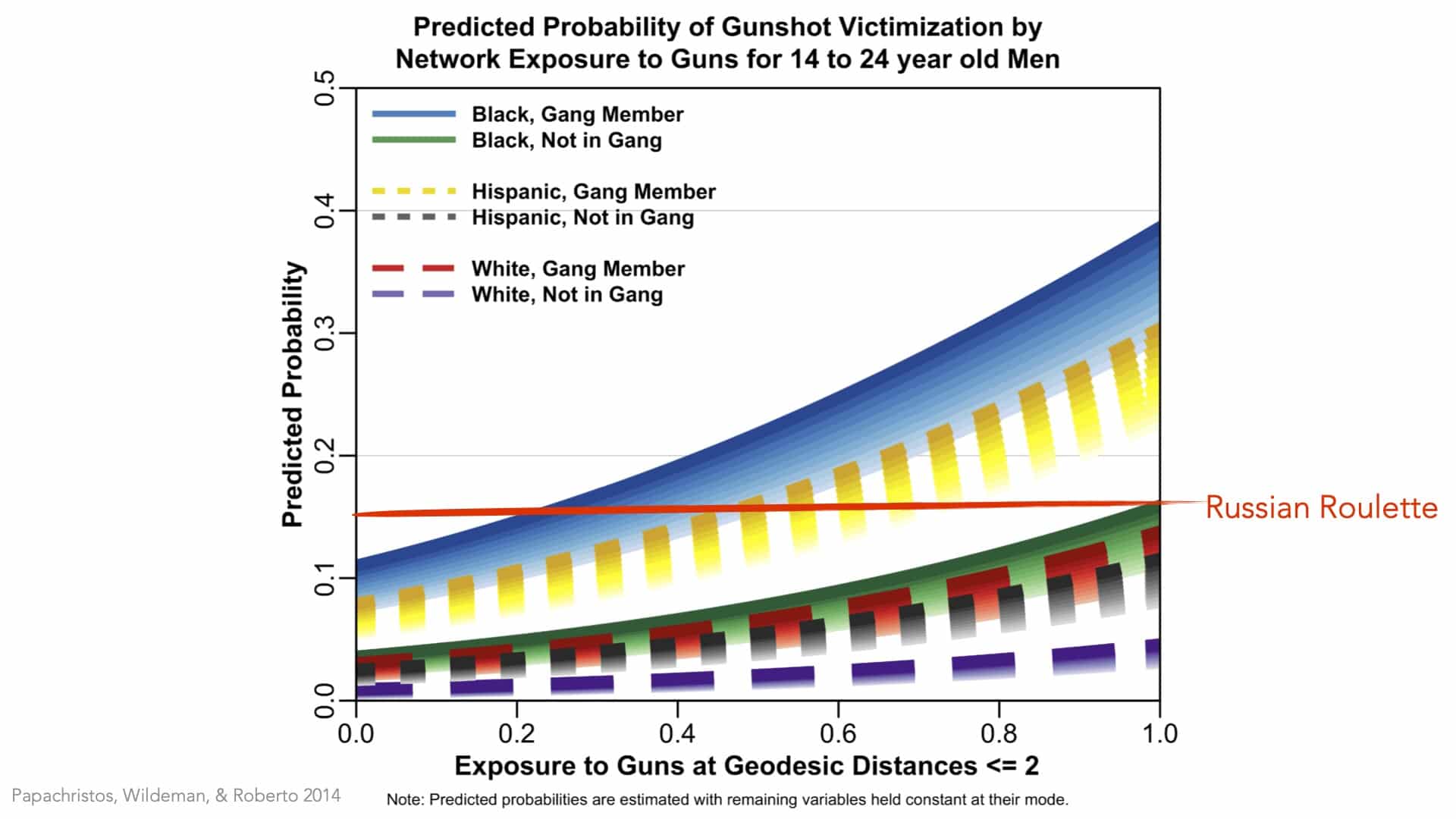
Dr. Papachristos’s research also illustrated that violence is contagious and that interrupting a potential shooting could have a cascading effect, preventing further instances of violence. He showed how he uses network science to track shootings that chain together within a social network. In Chicago, around 63% of shootings studied occurred within these chains of violence, with an average of 83-120 days between each instance. Each of the moments between these instances represents an opportunity for intervention, when victim services, trauma response teams, or outreach workers could coordinate efforts to stop the further spread of violence. When the number of responders is limited, this information is especially valuable because it helps them make the best use of their time.
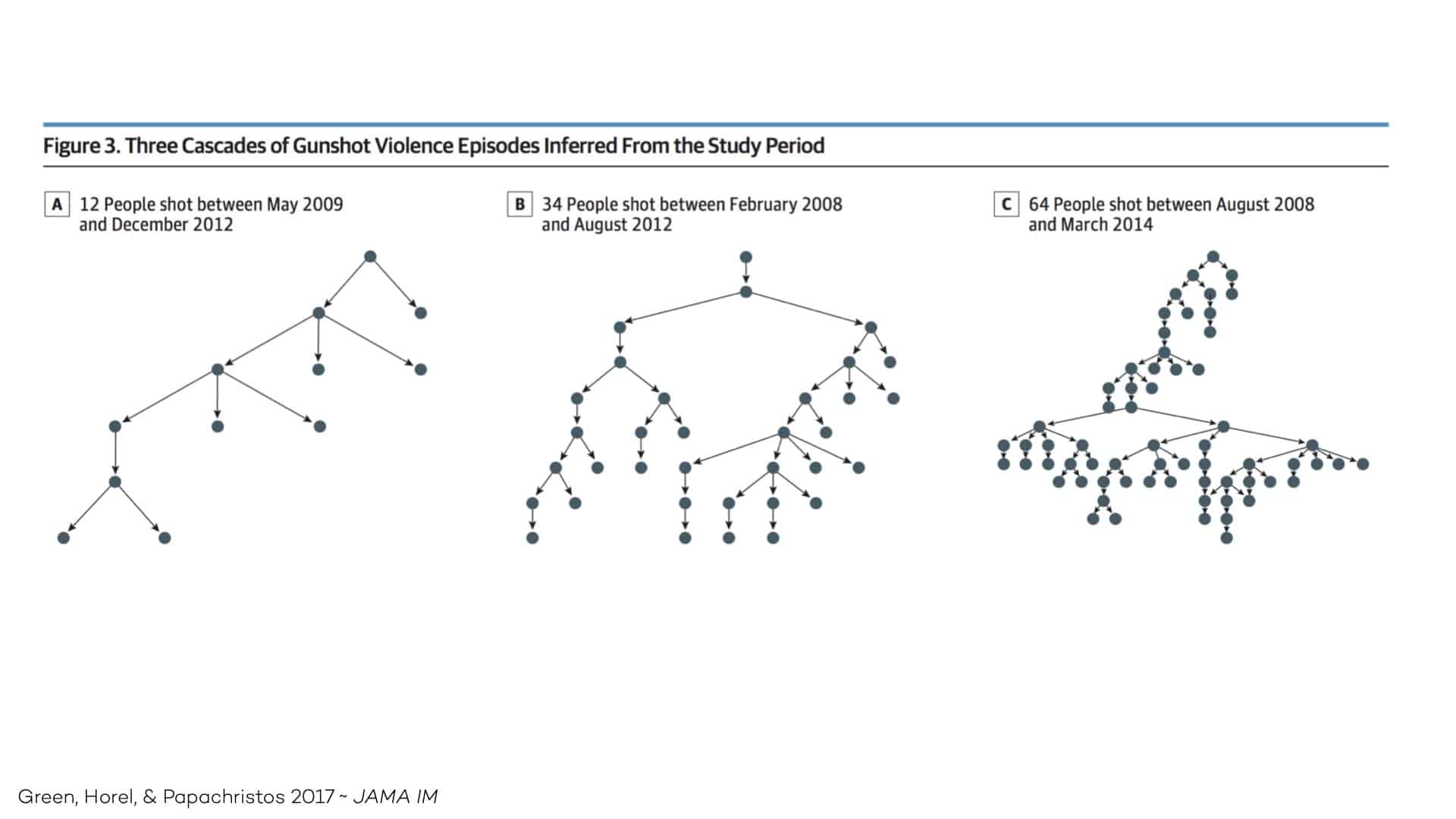
As the Mutual Aid Collaborative network entered into discussion with Dr. Papachristos, many Fellows were interested in the root causes that might catalyze a cascade of community violence. Their conversation centered around the effectiveness of poverty abatement, after-school programs, and job programs in preventing future violence. Dr. Papachristos spoke to the need for community activists to take the time to understand root causes while simultaneously engaging in an immediate response to gun violence. He asked Fellows to consider that the average age of a victim of gun violence in Chicago is 27 years old. Examining a root issue such as schooling and primary education would not be doing much for the 27-year-old linked to a network in which gun violence has previously occurred. Systemic problems, such as poverty and education, demand attention, but solutions take time to implement and typically work to benefit future generations. Immediate answers to violence, such as street outreach work, are also needed for prevention.
The conversation between Dr. Papachristos and the Mutual Aid Collaborative network also touched on the importance of narrative when framing incidents of gun violence. Peace Fellows told powerful anecdotes about their work around gun violence and its impact on individual people. For instance, Lisa Daniels, a 2019 Chicago Peace Fellow, spoke about the importance of rewriting the narrative about "offenders" of gun violence. Addressing these narratives allows the "offenders" to understand themselves as victims before their offense rather than viewing themselves as intrinsically violent people. What she claimed is critical in conversations about trauma and healing is that we "remind the individual that they are not the worst thing they have ever done" and consider the “stories victims tell themselves about who they are and what they have experienced." Dr. Papachristos expressed that he tries to capture a similar sentiment in his presentations, referring only to "victims" of gun violence:
Nothing else should matter when you’re trying to save a life.
The meeting between Dr. Papachristos and the Mutual Aid Collaborative network linked rigorous empirical research into the structure of gun violence with the lived experiences of those who work in violence prevention. As community leaders reflected on the data Dr. Papachristos shared and its implications, they also envisioned its potential uses in their own violence prevention projects. A recurring theme throughout the presentation was that there is not a unilateral solution to the epidemic of gun violence, but that different people find different solutions which lift them and members of their communities outside of the cycle of violence. This insight stresses the importance of collaborative action amongst community activists, which the Mutual Aid Collaborative aims to facilitate. It is critical for grassroots partnerships to be created to provide individuals caught within networks of violence with a range of resources that can suit their diversity of needs.
Safety Net Launches Blood Drive
By Zeki Salah, Facilitator, Mutual Aid Collaborative
Chicago Peace Fellows are working to address an increased demand for blood from Black and Brown donors through holding a Mutual Aid Collaborative Blood Drive. The Blood Drive is part of an ongoing Safety Net project by the Chicago Peace Fellows Mutual Aid Collaborative, a group of 60 Black and Brown leaders and committed allies who live and work in the communities they serve on the South and West sides. Fellows working on the Safety Net project seek to address multiple pandemics that ail the South and West Sides of Chicago, including COVID-19 and community violence.

The Safety Net campaign is accepting donation pledges until June 28th, but you can donate at any time after making the pledge. You can sign up for the Safety Net team’s blood drive here: https://sleevesup.redcrossblood.org/campaign/give-from-the-heart/
You can also promote the blood drive by using the hashtag: #OurBloodMatters
The Safety Net project started at the height of the COVID-19 pandemic by creating a distributed network of PPE providers throughout a grassroots network, but has since expanded its scope to include broader public health issues. Since its inception, the Safety Net project has also held COVID vaccine clinics to address the disproportionate impact of COVID-19 on Black and Brown communities. The Chicago Peace Fellows Blood Drive is the latest project by the Safety Net team and seeks to address a shortage of Black and Brown blood donors.

More Black and Brown donors are needed in the United States because of a rise in demand for some rare blood types that are more common in people of Black heritage. Certain subtypes of blood need to be matched to treat blood diseases such as sickle cell anemia. Blood donors are screened to see if they might possess certain rare blood types, which can also help match plasma and bone marrow donors. The demand for blood that the Safety Net team seeks to address is expected to increase even more during the summer, due to the increase of accidents such as car crashes and fireworks, as well as spikes in cycles of gun violence. This can put patients who need blood in consistent quantities at risk as these sorts of incidents risk depleting the blood reservoir that their treatments draw from.
The Safety Net wanted to bring attention to the need for a more diverse blood bank after learning that the director of the Chicago Peace Fellows, Burrell Poe, was diagnosed with aplastic anemia. Treatment for aplastic anemia requires bone marrow transplants, which can only be performed if the donor and recipient have matching subtypes of blood. In solidarity with Burrell, the Safety Net team scheduled their Blood Drive around his birthday, so that members of the community could be made aware of the importance of blood donations and their potential to transform the lives of other people.

Jacquelyn Moore of the Safety Net team donated blood in response to the blood drive and found the experience to be fulfilling as an altruistic act, while also gaining new insights into her own health. Jackie was touched by the campaign on a personal level because a blood drive saved her husband’s life after it connected him with a match for a stem cell transplant. She stated “giving blood provides a way to directly help the community and provides people with an opportunity to act, to improve the lives of people around them.” Additionally, Jackie noted the pragmatic benefits donors receive when giving blood. After giving blood, she was contacted by the Red Cross and given a report of her COVID-19 antibodies. She noted that the Red Cross also provides other reports on other aspects of the health of its donors and can act as a free health screening. At the screening, vital signs are checked and problems such as high blood pressure, arrhythmia, or low hemoglobin levels can be detected.
The Safety Net team’s blood drive campaign also seeks to dismiss myths about giving blood. They assert that giving blood is not painful, and can even be relaxing as it gives the donor an opportunity to sit back and take a break from the hustle and bustle of the day. Additionally, the Safety Net encourages members of the LGBTQ+ community to explore the possibility of giving blood, because many of the previous restrictions against donors within this community have been lifted. Lastly, the Safety Net team emphasizes the safety of giving blood, donation centers undergo strict COVID precautions and there is a low risk of contracting COVID while giving blood.
Second Annual Chicago Peace Fellows Music Festival
By Zeki Salah, Mutual Aid Collaborative Facilitator
The Chicago Peace Fellows held a Concert for Peace on June 4th, celebrating the artistic accomplishments of their communities and a shared commitment to improving their neighborhoods. The Second Annual Chicago Peace Fellows Music Festival was held at the Hatchery in Garfield Park with Peace Fellows gathering performers from across the city to play music, sing songs, read poetry, and dance. The Music Festival was organized by a committee within the Peace Fellows Mutual Aid Collaborative, a group of 60 Black and Brown leaders and committed allies who live and work in the communities they serve on the South and West sides.

The event was made streamed live on the Goldin Institute’s Facebook page where you can watch the recording.
The Music Festival Committee is made up of musicians and educators that have first hand experience with the transformative power of music and its positive impact on communities. The committee pooled their connections to create a lineup with a diversity of talents that represented neighborhoods across the city. The Peace Fellows Music Committee is made up of Peace Fellow Alumni from across the cohorts of 2019, 2020 and 2021: Gloria Smith of the Black Star Project, Angelina Zayas of the GAP Center, Juliet Jones of the Original 64th Street Beach Drummers, Margaret Murphy-Webb of the South Side Jazz Coalition, Marvinetta Penn of Global Girls, Inc., Rashada Dawan of B.Fli Productions, and Robin Cline of Neighborspace.

As musicians, artists, and educators, members of the committee had an eye for both talent and opportunity, bringing together talented members from their communities to perform. Many of the performers at the Peace Fellows Music Festival were young people for whom the festival provided an opportunity to gain experience performing, show off their talents, and be compensated for their time and effort. Additionally, by bringing together artists from across the city, the Peace Fellows Festival allowed for them to network with each other and collaborate in their artistic ventures.

The Peace Fellows Music Festival featured an eclectic range of performances, including jazz, hip hop, and classical music, as well as spoken word poetry and choreographed dances. Finding talent for the Festival was a collaborative effort, with multiple organizations spreading the word and connecting talent to the festival.
Performers included:
- Guru Tonic
- Heart Cry
- Kenya Braitwaite
- Mara Mitchell
- Global Girl Youth Company
- Phoenix
- The Original 64th Street Drummers
- Margaret Murphy-Webb
- MC Skool
- Ethan Clay
The Festival was held at the Hatchery, a non-profit food and beverage incubator which provided the space for free. While the Hatchery primarily serves to provide professional development to people in the food services industry, both the Hatchery and the Peace Fellows involved in the Festival have a common goal of connecting underserved communities with access to education, opportunity, and community resources.

The theme of peace was emphasized throughout the Festival as performers and organizers spoke to the importance of arts education, mutual aid, and community activism. Peace Fellows and their organizations were invited to set up tables and share information about their organizations for the first hour of the festival. This allowed for Fellows representing neighborhoods throughout Chicago to share resources with each other and network.

As the concert came to a close, 2020 Chicago Peace Fellow, Maragret Murphy-Webb, spoke to the importance of investing in arts education. She emphasized that the arts have the capacity to improve communities and combat violence: “If you put an instrument in a child’s hands, you can keep a gun out of their hands.” She encouraged audience members to engage with the City of Chicago and request more funding for arts and education in the South and West Sides so that underserved neighborhoods might have greater access to educational opportunities.

Through bringing together community members, providing them with opportunities, and affirming a collective commitment to peace through music and art, the Peace Fellows Music Festival sought to improve the communities represented by the Chicago Peace Fellows. Fellows’ commitment towards representing and improving their neighborhoods was pivotal to the Festival’s success.
Connecting Community Members with the Research of the University of Chicago Crime Lab
By Zeki Salah, Facilitator, Mutual Aid Collaborative
Chicago Peace Fellows hosted a conversation at the Firehouse Community Arts Center on June 3, 2022 to discuss community safety and crime data with the University of Chicago Crime Lab. The event was held as part of the Mutual Aid Collaborative’s Civic Leaders series, which is designed to connect alumni of the Chicago Peace Fellows with policy makers, academics, and community activists that are leading innovative work to promote community safety and prevent violence in their neighborhoods.

At this event, the Peace Fellows met with Kim Smith, the Crime Lab’s Director of Programs, to learn about data that the Crime Lab collects and how it has been used to shape policy decisions. Members of the Lawndale community also came to attend the presentation and learn about how they can engage with the Crime Lab’s research.

The Crime Lab’s presentation focused on the disproportionately high rate of gun violence in Chicago as well as the disproportionate impact of this violence on communities of color. In 2020, there was an increase in violence crimes, and homicides in particular, in Chicago. While other large cities such as Los Angeles and New York have lowered their homicide rates, Chicago’s rate of homicides has increased from 2010-2020. This violence also affects men of color more so than any other group: 80% of shooting victims in 2020 were Black and 86% were male. Black men also carry a dual burden of incarceration alongside gun violence victimization, with the percentage of Black men aged 20-24 being over five times greater than the percentage of white men of the same age group.

Peace Fellows, the Crime Lab, and other members of the community spent much of their time together talking about the causes of this disproportionate violence and potential solutions. The Crime Lab noted that the majority of homicides were not motivated by money, gang interests, or other instrumental purposes, but were spurred by personal altercations between individuals. Members of the community attributed some of the causes of the increase in violence to the way incarcerated people are rehabilitated and to increased absences in schools after the outbreak of the COVID-19 pandemic. Community members and Kim Smith of the Crime Lab mutually agreed that street outreach workers who work at personal level with community members are often successful in addressing these kinds of personal altercations and that there is a need for funding in this area.

Meeting together helped Peace Fellows build connections between their own experiences and the data captured by the Crime Lab. In their presentation, the Crime Lab showed that 16,000 children became disengaged during the pandemic. Pamela Montgomery-Bosley began working as a violence prevention manager with youth after her son was shot and killed and spoke to her experience working with children in unstable homes. She spoke to her experience seeing children struggle with their home lives while finding some stability at school, but noted that schools are now having difficulty keeping children in classrooms. Kim supported this argument by citing Crime Lab data that over one in nine children in options schools, which are largely composed of students who were previously disengaged from school, have been involved in violent incidents. She also noted the increased rate of victimization and arrests amongst option schools students.
Meeting with the Crime Lab showcased to Peace Fellows how data can give deeper insight into the disproportionate levels of violence in communities of color. Data can support personal experiences around issues such as violence and disengagement in school, giving them greater weight. This can enhance communications, donation campaigns, and grant proposals for grassroots organizations in need of resources. Kim encouraged Peace Fellows to request data from the Crime Lab to supplement their own work, noting that even if the Crime Lab does not have data around specific issues, a request could help direct future research.
The meeting between Peace Fellows and the Crime Lab worked to bridge the gap between the research of the Crime Lab and the members of the communities they study. Kim Smith noted that the Crime Lab often has difficulty connecting with grassroots leaders and sharing its data and that they are looking for ways to engage more with local communities. By connecting with the Peace Fellows, the Crime Lab will be able to better share its research and direct its focus towards interests that are guided by community input. This in turn will help the Crime Lab provide community members with a deeper understanding of the problems they are facing and offer potential solutions to the spread of violence.
Generating food, beauty and safety for neighbors in Chicago
By Yusuph Masanja, Co-Facilitator, Global Alumni Network
Goldin Global Fellow from Chicago, Robin Cline, serves as Assistant Director of NeighborSpace, the only nonprofit land trust in Chicago that preserves and sustains gardens on behalf of dedicated community groups. NeighborSpace has helped neighbors and community groups protect over 120 outdoor sites, transforming them into places where people gather to play, to grow food together, and to organize around issues in their neighborhood.
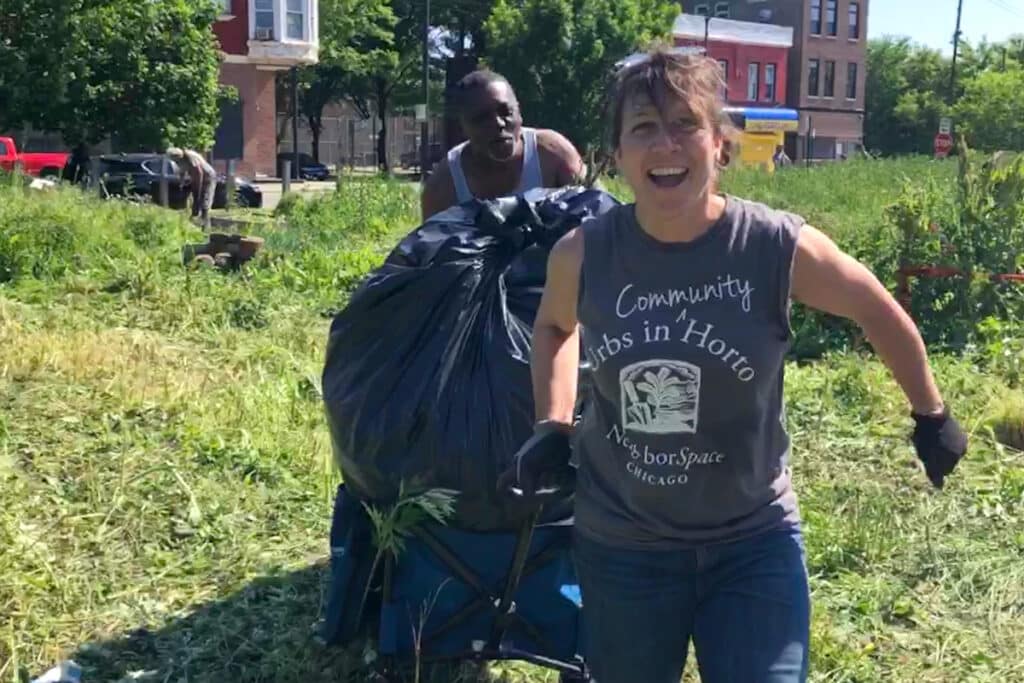
NeighborSpace continues to help community groups identify outdoor sites that can be turned into community garden spaces. They partner with early community organizations, early childhood teachers, seniors, and families in turning potential unused sites into gardens and creative gathering spaces. Especially now in the time of COVID, these outdoor spaces are more and more used as places for free haircuts, food distributions, COVID tests, and community meetings.
NeighborSpace continually works to support more growing and gathering space, and you can help with this New Year’s goal of adding 100 garden beds to NeighborSpace sites across Chicago, by visiting this Crowdfunding page to help NeighborSpace reach this goal before the 2021 growing season.
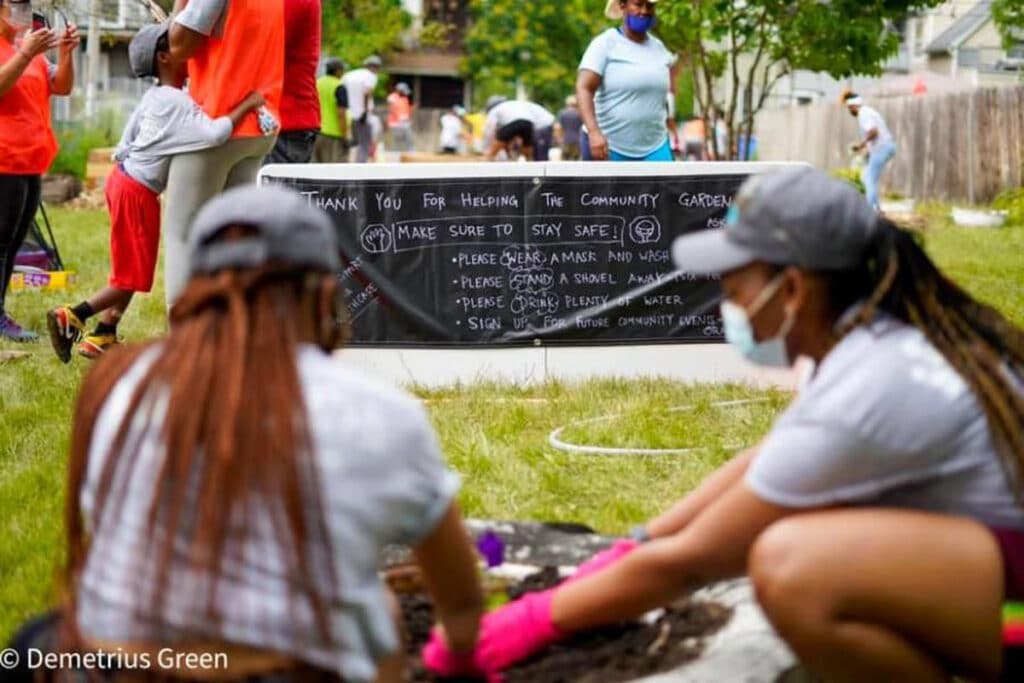
For Robin, the motivation to dive into this work comes from the goal to encourage urban people to reconnect with nature, themselves, and their community. Robin believes that if you set the right conditions for people to understand a series of processes, like that of a plant ––from seeds to fruits––it helps them understand the importance of how connected we are.
"How can we create opportunities for people to have physical connections to shared public spaces that then prompt them to have in-person connections with their neighbors?"
/Robin has recently graduated from the Visual Collaboration course which was offered by the Bigger Picture Academy. Having been inspired by this collaboration tool, she is considering applying it to support processes by which the garden leaders conduct their community building vision. Robin is mobilizing resources to provide these leaders with access to computers and the Mural application in order to learn and start using Visual Collaboration methods.
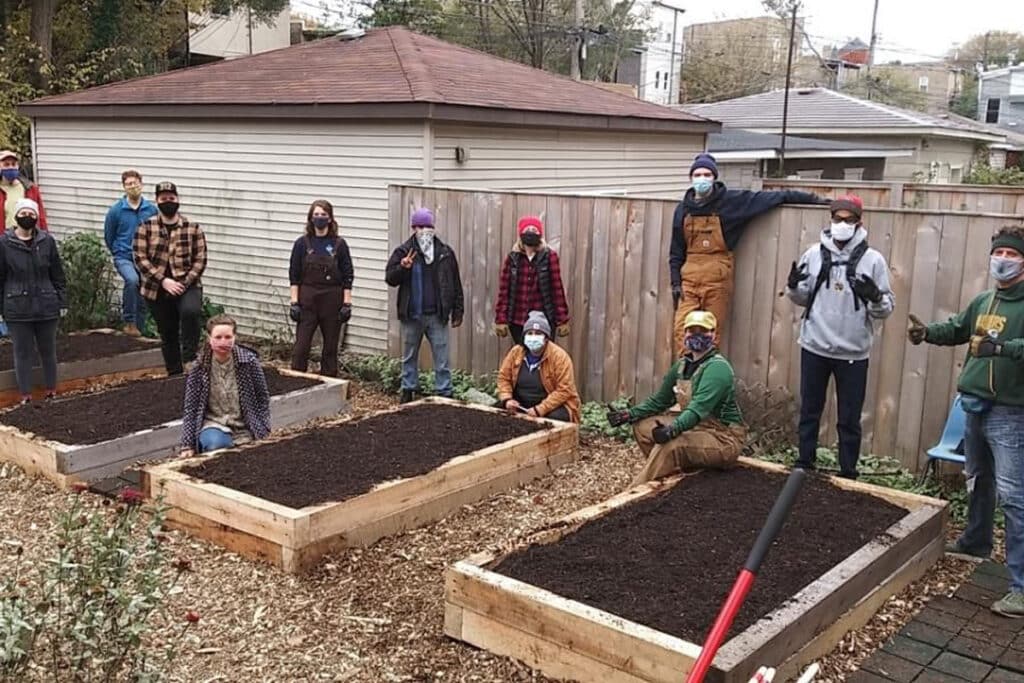
Furthermore, Robin finds inspiration from the stories of Goldin Global Fellows. The stories motivate her to keep up the good work despite challenges faced from time to time.
"Hearing other people’s stories of salvation and struggle fuels the work I am doing. We are doing non-profit work that sometimes feels invisible."
Robin adds: "The sharing of stories is so 're-storying' which is so restorative, I feel like that's an important part of the Goldin Global Fellows connection- to support each other in serving others."
Dear White Funders: I Can't Breathe Either
by Frank Latin, 2019 Chicago Peace Fellow
My name is Frank Latin and first and foremost I’m a black man. I am also the founding Executive Director of Westside Media Project, a small non-profit organization on Chicago’s West side that works to provide exposure to students (and now adults) in media/technology related fields.
I’ve been wanting to get this off my chest for a few years. Now, with the unfortunate murder of George Floyd and the ensuing worldwide protests, which have led to ongoing discussions around the topic of systemic racism, I feel this is the perfect time.
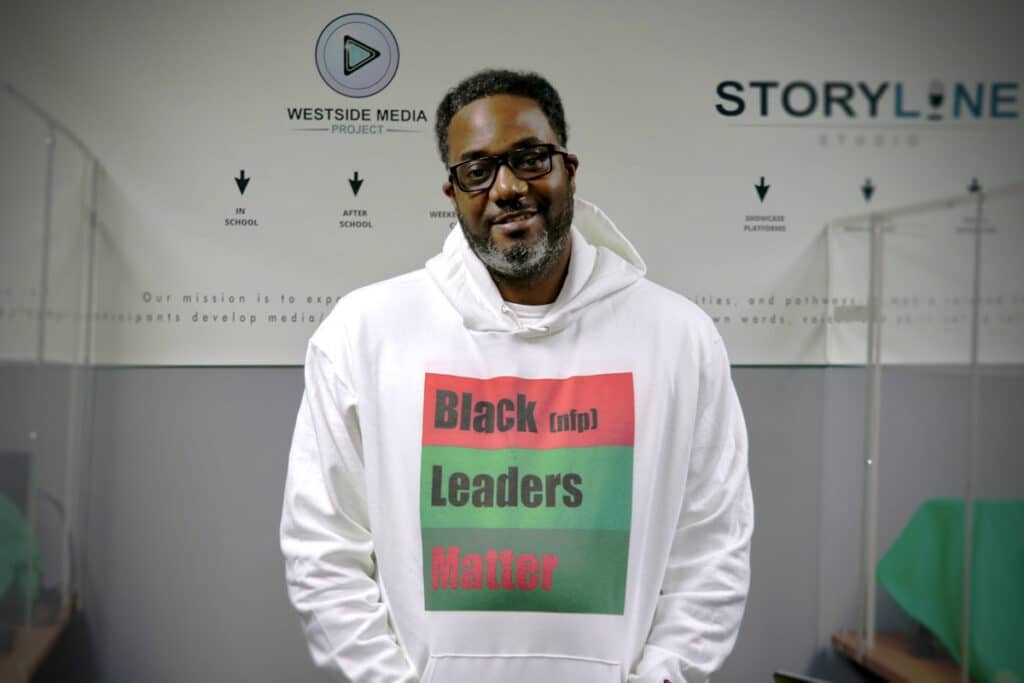
What I’ve learned in 14 years of running a non-profit is that philanthropy is one of the most racist sectors of society, competing neck and neck with the criminal justice, education and the health care systems in America. In fact, my view is that philanthropy works to bolster and prop up those other sectors by reinforcing the status quo. It is based on white society’s ‘Savior complex’ and supports white leaders at all costs, even those doing work in black and brown communities.
The perceptions I had of an uneven playing field used to upset me and have me somewhat disgruntled. However, I came to realize my perceptions were reality and have been substantiated in multiple studies, the latest published in December of 2019 by the Bridgespan Group, titled ‘Disparities in Funding for Leaders of Color Leave Impact on the Table.’
Philanthropy assumes that black and brown people living in distressed communities are part of the problem rather than part of the solution. I come to realize that as a professional, educated black man, I simply do not fit within the current model of philanthropy, primarily because I look like, walk like and talk like the residents on the west side of Chicago. The notion of a black man doing positive work in a black community without a white brain-trust or network to validate the organization is not enticing to funders. I lack what I term “white insurance” to make funders feel comfortable that their support is safe.
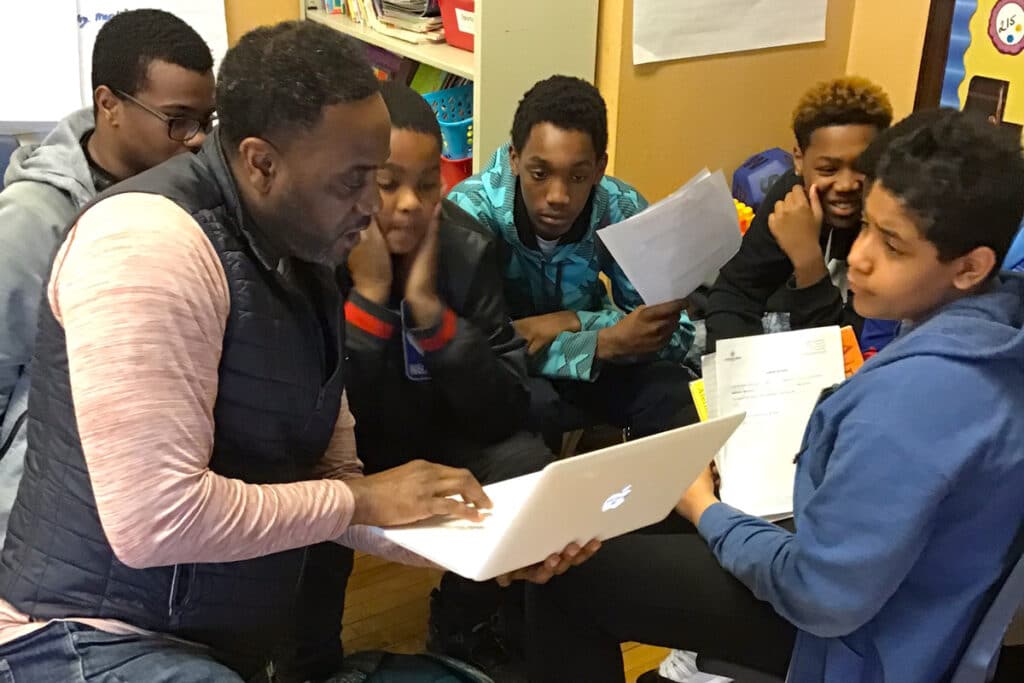
I’ll admit, when I started the organization back in 2006 I had little to no knowledge of how philanthropy worked. What I did have was a bachelor’s and a master’s degree in economics with years of experience working at a government agency so I was more than capable of learning the ropes. I decided to begin a volunteer project that eventually became something much bigger; but which I still do voluntarily.
Chicago is home to a vibrant philanthropic community and they support issues and causes not only here in the city but around the globe. However, here in the city they seldom support organizations led by leaders of color working to address those very issues, and in those instances when they do, it will rarely, if ever be at the same level shown for white led organizations doing similar work.
This has directly led to a tiered, apartheid-like structure within non-profits in Chicago where there is a huge gulf between white led organizations and those headed by leaders of color. It also perpetuates ‘culture vultures’ who seek advancement, profit and notoriety off both the misery of black and brown people as well as the structural racism that exist within philanthropy. It also encourages phony alliances in which whites who yield privilege and influence utilize people of color as fronts or tokens to gain inroads into certain communities.
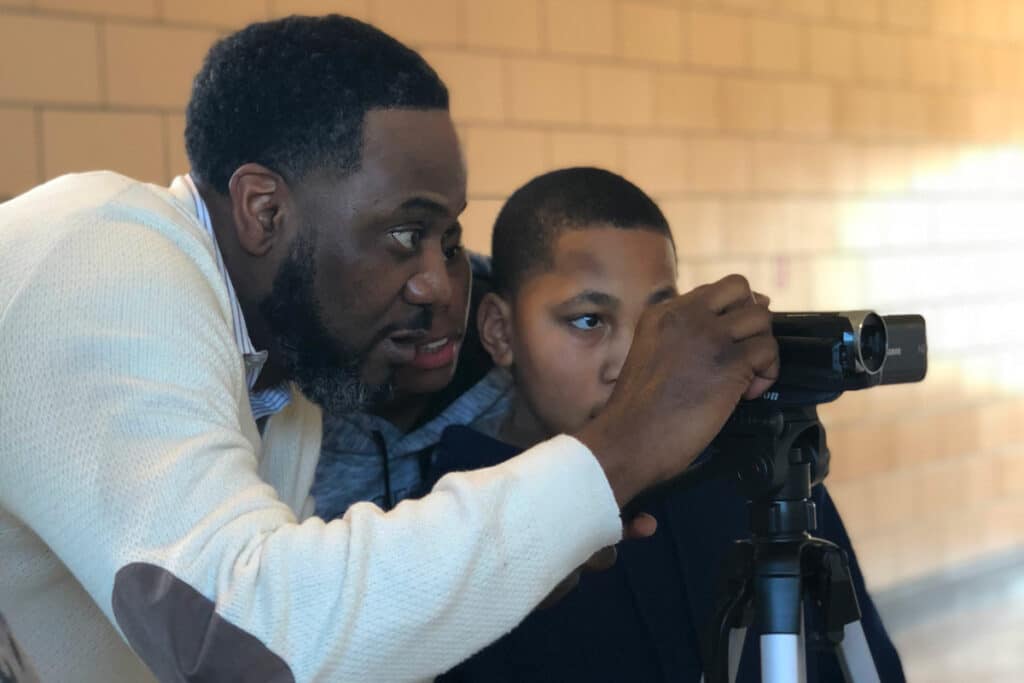
The Covid-19 pandemic has put a spotlight on the health disparities that have always existed in America. Police misconduct has been thrust back into the headlines again, and rightfully so.
Philanthropy on the other hand, is a sector that often goes unnoticed and its racist policies and practices never get splashed across the evening news or social media posts. However, the lack of funding provided to leaders of color added with the desire to prop up white leaders to do work in minority communities has devastating effects. At times, it works like a sniper, taking would-be leaders right out the field. Other times it provides a slow death, reminiscent of a choke hold or a knee to the neck not allowing organizations ran by leaders of color to service our communities.
To the philanthropic community of Chicago...I CAN’T BREATHE!!
Learn more about Chicago Peace Fellow Frank Latin's work at WestsideMediaProject.org.
Support the Mutual Aid Collaborative

